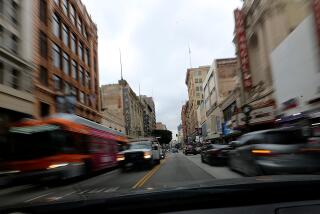Garcetti’s ‘hackathon’ for city transparency didn’t go as expected
- Share via
One goal of Los Angeles Mayor Eric Garcetti’s weekend “hackathon” was to have computer coding experts quickly create new apps that would help engage residents and businesses with reams of online information on city government and operations.
But the two-day marathon highlighted both the possibilities and the limits of such high-profile tech events to deliver quick advances for government bureaucracies pursuing digital-age transparency.
Many of the competing teams, including the grand prize winner, sidestepped an expanded batch of city data unveiled Saturday on the website by the mayor, saying it wasn’t comprehensive or they didn’t have enough time to work with it.
Peter Marx, Garcetti’s chief innovation technology officer, welcomed the criticism as “exactly the sort of feedback” the city was seeking. “If we didn’t hear anything, we’d be worried,” he said.
In October, Garcetti unveiled a government performance website intended to make City Hall more responsive and accountable. It drew criticism from experts in part because it relied heavily on bar graphs summarizing information and not rich, detailed data sets.
The additional information released over the weekend was part of an effort to remedy that. It included data on crime, car crashes, street lights, business licenses, stray animals, graffiti clean-up and more.
At the hackathon, the second-place entry used newly available water usage data to make an app to report waste. It was one of just a few of the 21 teams that presented their applications Sunday that used the latest data.
Zach Latta, whose team won first place for its app that connects homeless shelters with volunteer groups and restaurants, said there weren’t enough data sets available related to homelessness, and the ones that were available weren’t comprehensive enough for what his team needed. They instead relied on crowd-sourcing data to build their app.
Other participants said that with more time they might have been able to better use the city data.
Marx said the city will continue to add to and refine its data. The difficulties encountered over the weekend, he said, were the “inevitable collision between us as a city government grappling with this idea of open data and at the same time working with folks on the outside. In the government world, this is pretty extraordinarily fast-moving.”
soumya.karlamangla@latimes.com
More to Read
Sign up for Essential California
The most important California stories and recommendations in your inbox every morning.
You may occasionally receive promotional content from the Los Angeles Times.














